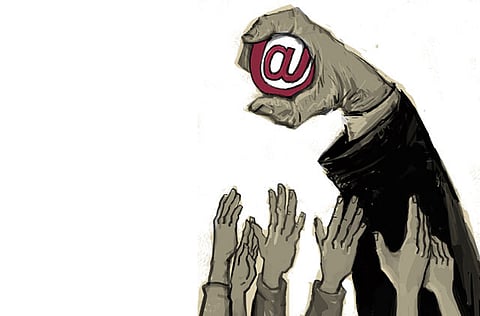Only dialogue can facilitate a truly open web
Arab world cannot let one or other group of stakeholders control the internet

In a world where the Internet has become a fundamental factor behind economic and human development, the Arab world remains far behind. Internet penetration among Arab-speakers as of 2011 was a mere 23.9 per cent, which is far less than the world average of 33.2 per cent.
When it comes to Arabic-language content online, the situation is even more dismal. Out of all websites of the world, only 0.15 per cent are in Arabic language. With a bit of math, one can see that as a group representing 5 per cent of the world population, this number is extremely small and indicates a severe deficiency that must be addressed if the Arab world is to progress and catch up with the rest of the world in terms of Internet access and content levels.
To address some of those key issues, the Arab Internet Governance Forum (AIGF) was officially launched in January 2012 with a mandate to help bridge this divide and deliver the Internet’s promise in supporting development and progress in the region. As a member of the first multi-stakeholder advisory board of AIGF, I found this step to be tremendously important on more than one level.
Firstly, this is truly the only pan-Arab initiative supported by the UN and hosting governments to tackle Internet issues directly with a multi-stakeholder approach inspired by the global Internet Governance Forum (IGF) that is held annually.
Secondly, by allowing government officials, civil society, academics, businesses, technicians and engineers along with other stakeholders, AIGF could inspire a paradigm shift in how governance ought to be. For many generations, authoritarian rule had established a centralised and undemocratic approach to governance on many levels.
By introducing a forum where there is a chance for every sector to participate, there is an opportunity for the first time to break away from this outdated tradition that had held the region back for so long.
I argue that being a global decentralised network of computers and people, the Internet is resilient to the control of any single party, country or sector. Hence, it becomes natural that the only approach to deal with it will have to be a multi-stakeholder approach. It can became a democratising tool that could help break old habits and traditions around governance.
The first annual AIGF meeting held in Kuwait was successful in many aspects and witnessed a great degree of freedom of expression in the panel sessions and during workshops and debates. It marked a level of understanding that Internet issues cannot and should not be held hostage to political agendas that are driven by ideology or allegiances.
The Internet is for the people and, hence, the overall interest of the public needed to rise above all others. Kuwait had effectively passed the test in not interfering in the event and letting it take its course.
Algiers meeting
The second annual meeting of AIGF is currently scheduled for October 1-3 in Algiers and will have several areas that collectively cover most of the important Internet-related issues that the Arab world is concerned about. Those themes are access, openness, security and privacy, content, critical Internet resources and youth involvement.
In general, the main challenge for the AIGF is mainly to prevent the takeover or domination by any of the stakeholders. There is a chance that host governments may consider imposing some restrictions or limit the level of freedom to discuss or debate during those events. Doing so could jeopardise the multi-stakeholder approach and skew it towards one or more parties.
Algeria has the opportunity to make the event a success by allowing the free and unrestricted discussions by all parties to demonstrate the true nature of the Internet: a free and open space for debate and expression.
Let me be clear that I don’t see the AIGF as the silver bullet that would solve all Internet problems in the region. It is understandable that a couple of AIGF meetings are not enough to achieve the growth in Arab Internet usage and content.
But AIGF is an initiative that is meant to spark a discussion, an exploration of ways to make the Internet more accessible and effective in changing the region to the better. What is more important than holding AIGF meetings is to follow through the recommendations that emerge out of them because without follow-up action, any meeting would be useless.
That is precisely why the impact of AIGF will be judged on how well its outcomes could be translated into a reality and that can only happen with the leadership of governments and involvement of the different stakeholders involved.
— The writer is a member of the advisory committee at Arab Internet Governance Forum.



